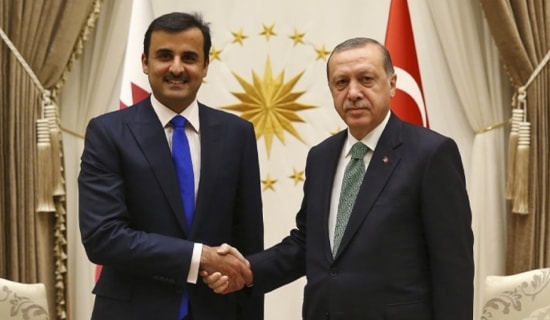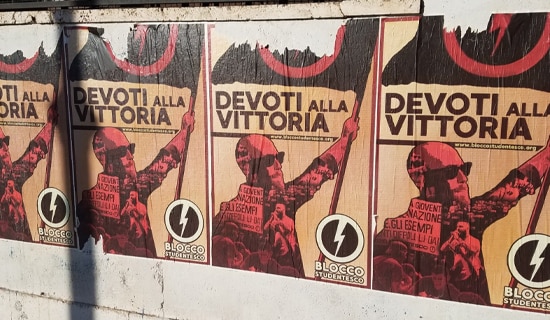In a June 16, 2015 article in Cornerstone, the journal of Georgetown University's Berkley Center for Religion, Peace & World Affairs, MEMRI Vice President Alberto M. Fernandez discusses the history and plight of Christians in the Middle East.
The following is the article:
"The horrific sectarian carnage in Syria and Iraq, with chauvinistic Shi'a regimes arrayed against suffering Sunni Arabs, has been a key element in attracting foreign fighters, which has in turn ramped up the vitriolic appeal of Salafi-jihadist groups like ISIS. That has translated into extreme action on the ground. Posing as defenders of an embattled Sunni Arab Islam, they seek to crush anything in their path different from themselves. The result is a rending of the region's social and ethnic fabric not seen for a century, if not longer. The anti-Christian animus of ISIS has long-standing establishment enablers and is something that US foreign policy must confront if a more humane and tolerant region is to emerge.
"Recently an ISIS attack overran some villages of Assyrian Christians living in a series of small farming communities on the banks of the Khabur River in Northeast Syria, and 232 of these Assyrians, 51 of them children and 84 women, were kidnapped. Most of them remain in captivity, with one account[1] claiming that ISIS is demanding $22 million (or roughly $100,000 per person) for their release. Those who were not kidnapped have been terrorized and dispossessed. We are also approaching the one year anniversary of the extinguishing of the Christian community in Mosul and the Nineveh Plains, communities which saw the arrival of Islam and survived the depredations of the Mongols and Tamerlane.
"While the majority of victims in the conflict raging in Syria and Iraq have been Muslims, Christians have borne a heavy burden given their small numbers. And the main battlefronts of the ISIS 'caliphate' have coincided with areas of Northern Syria and Northern Iraq (along with Southern Turkey) constituting the ancestral homeland of Syriac-speaking Christians - 'Bethnahrain' - tied to the history of the Church of Antioch (and belonging to the Syrian Orthodox Church, Assyrian Church of the East, and Chaldean and Syrian Catholics in communion with Rome). These are a small minority within the region's Christian minority. The same area constitutes the homeland of the Kurdish-speaking Yazidi people, who have also been singled out for extreme cruelty by ISIS.
"Almost exactly a hundred years before ISIS attacked these villages on the Khabur River, the grandparents of these Christians lived in the Hakkari Mountains of what is now southeast Turkey. In the 'Sayfo,'[2] the genocidal year of 1915, tens of thousands of members of this ancient church, once dubbed 'Mountain Nestorians' by American missionaries, fought their way outÔÇöfamilies and flocks led by their tribal leaders and bishopsÔÇöbreaking through Ottoman Turkish encirclement to the safety of Russian lines.
"After the war, the Turks did not permit Assyrians to return to their mountain fastness and so they settled in Iraq where they served the British as native police and soldiers. A newly independent Iraq in 1933 began sovereign rule by massacring some of these same tribesmen who once again had to flee, across the border, into French-controlled Syria. There, despite Syria's subsequent turbulent history, the sons of the tribes of Tkhuma, Tiari, Baz, Jilu, and Diz seemed to find a humble if bucolic sanctuary.
"Middle East Christians have been, in a way, canaries in the coal mine, and their current travails are important evidence of the sickness in the body politic of Middle East countries. Today the 'Sayfo' continues, and after repeated massacres and displacements, the question remains whether this people will have any future in their homeland. How can you have a Syriac Christian diaspora if there is no homeland? In the dirty game of high diplomacy, America and regional powers weigh their interests in fighting ISIS and make all sorts of tradeoffs. But I am not thinking of the big picture, but of a small people, humble, simple, precariously perched, once again running for their lives and fighting for refuge.
"The extirpation of Christians and Yazidis from the land is important for ISIS. ISIS senior cleric Abu Malik Anas al-Nashwan, a fully formed product of the Saudi educational system, recently devoted most of a video[3] featuring the killing of 30 Ethiopian Christians to a detailed exposition of how Christians should be treated: conversion to Islam, humiliation with the jizya (tax), or death. Unfortunately, the sentiment transcends ISIS and could well have been plagiarized from an official fatwa[4] from the late Abdul Aziz Bin Baz, Grand Mufti of Saudi Arabia, and was echoed recently by the Palestinian cleric Issam Ameira at the Al-Aqsa Mosque in Jerusalem.
"If it is a policy of the anti-ISIS coalition to reverse this entity's gains, then it should also be a priority of this same coalition to reverse the ethnic cleansing ISIS has carried out. What a gesture of tolerance and inter-faith solidarity it would be if countries like Saudi Arabia and Qatar, which share much of the Salafi worldview that ISIS boasts of, would make whole the losses of these brutalized communities.
"Such solidarity could also encompass the relatively intact if declining Syriac-speaking communities in Turkey's Tur Abdin region, the historic Iraqi Christian town of Alqosh, which never fell into the hands of ISIS, and concentrations of struggling Christian and Yazidi IDPs in Kurdistan's urban areas. A process of restitution to living communities and rescue of historical memory would also include the rebuilding of richly symbolic sites, such as the fourth century Syrian Catholic Mar Behnam Monastery, which was blown up by ISIS in March 2015.
"As for the West, scholar Keith Watenpaugh has powerfully described in a new book[5] the humanitarian impulse mobilized a century ago in very similar circumstances to help some of these same communities. Can our supposedly more compassionate society do as well to heal broken lives and restore communities on the land of their fathers? Christian charities are working to help displaced people of all faiths in the region. But nation states in the region and in the West still need to be convinced that investing in the preservation of ethnic and religious diversity is good politics and good policy for everyone."




